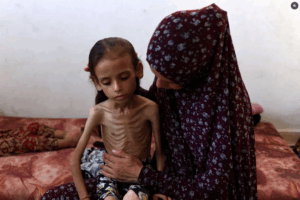The milk that never came: how famine in Gaza shatters the first bond and the soul of a nation

Nine-year-old Mariam Dawwas, a child suffering from malnourishment, and her mother in a displacement camp in Gaza City on 3 August 2025
Mark Brauner writes in The Palestine Chronicle on 2 August 2025:
In Gaza, famine is not a threat. It is a reality measured not only in calories and corpses but in something far more intimate: the silence between a mother and her child when the milk never comes. This is not only a humanitarian crisis. It is a biological and spiritual desecration.
A mother brings new life into the world, and in the sacred order of things, that life turns to her breast, seeking warmth, safety, nourishment. The first drops of colostrum are thick with antibodies, hormones, and history. They are the first sacrament of care, of belonging. But in Gaza, under siege, the breast is often dry. The baby suckles and finds nothing. And in that moment, a bond older than civilization begins to unravel.
I saw this with my own eyes, while practicing medicine in Gaza. Infants limp with hunger, too weak to cry. Mothers gaunt, ashamed, desperate, their own bodies wasting as they tried to offer comfort with arms that shook. They looked at me not for medicine but for mercy. And all I could think was: this is not how the world is supposed to be.
The biology is brutal. Starvation halts lactation. Cortisol floods the body under extreme stress, shutting down prolactin, suppressing oxytocin. No oxytocin, no milk. No milk, no immunity, no warmth, no hope. The baby’s gut becomes inflamed and porous. Infections race in. Muscles waste. The brain, lacking fat and glucose, slows. A child who does not breastfeed is not only hungry, they are unmoored from the biological cradle that teaches trust, rhythm, and connection. Many children die. If they survive, they live in a body and mind etched with trauma.
This is more than a tragedy between one mother and one child. This bond is the first social contract. It is the first act of giving and receiving, the first heartbeat of civilization. When that contract is broken, when thousands of mothers cannot feed thousands of babies, what is torn is not just flesh. It is culture. It is continuity. It is the future.
We rarely speak aloud just how holy this feedback loop is. When a baby suckles, it is not simply extracting milk. It is sending a biochemical signal through the nipple to the mother’s brain, which responds by releasing prolactin to make more milk, and oxytocin to let it down.
